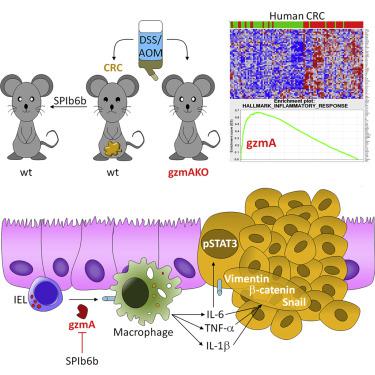Cell Reports ( IF 7.5 ) Pub Date : 2020-07-07 , DOI: 10.1016/j.celrep.2020.107847 Llipsy Santiago 1 , Marta Castro 2 , Rebeca Sanz-Pamplona 3 , Marcela Garzón 1 , Ariel Ramirez-Labrada 1 , Elena Tapia 4 , Víctor Moreno 5 , Elena Layunta 6 , Gabriel Gil-Gómez 7 , Marta Garrido 7 , Raúl Peña 7 , Pilar M Lanuza 1 , Laura Comas 8 , Paula Jaime-Sanchez 1 , Iratxe Uranga-Murillo 1 , Rosa Del Campo 9 , Pablo Pelegrín 10 , Eric Camerer 11 , Luis Martínez-Lostao 12 , Guillermo Muñoz 13 , José A Uranga 14 , Anabel Alcalde 6 , Eva M Galvez 8 , Angel Ferrandez 15 , Phillip I Bird 16 , Sunil Metkar 17 , Maykel A Arias 8 , Julian Pardo 18

|
If not properly regulated, the inflammatory immune response can promote carcinogenesis, as evident in colorectal cancer (CRC). Aiming to gain mechanistic insight into the link between inflammation and CRC, we perform transcriptomics analysis of human CRC, identifying a strong correlation between expression of the serine protease granzyme A (GzmA) and inflammation. In a dextran sodium sulfate and azoxymethane (DSS/AOM) mouse model, deficiency and pharmacological inhibition of extracellular GzmA both attenuate gut inflammation and prevent CRC development, including the initial steps of cell transformation and epithelial-to-mesenchymal transition. Mechanistically, extracellular GzmA induces NF-κB-dependent IL-6 production in macrophages, which in turn promotes STAT3 activation in cultured CRC cells. Accordingly, colon tissues from DSS/AOM-treated, GzmA-deficient animals present reduced levels of pSTAT3. By identifying GzmA as a proinflammatory protease that promotes CRC development, these findings provide information on mechanisms that link immune cell infiltration to cancer progression and present GzmA as a therapeutic target for CRC.
中文翻译:

细胞外颗粒酶A通过增强肠道炎症促进大肠癌的发展。
如果不适当地调节,则炎症性免疫反应可以促进癌变,如在大肠癌(CRC)中明显。为了获得对炎症与CRC之间联系的机械理解,我们对人类CRC进行了转录组学分析,确定了丝氨酸蛋白酶颗粒酶A(GzmA)的表达与炎症之间的密切相关性。在葡聚糖硫酸钠和乙氧基甲烷(DSS / AOM)小鼠模型中,缺乏和药理作用抑制细胞外GzmA既可以减轻肠道炎症,又可以防止CRC的发生,包括细胞转化和上皮向间充质转化的初始步骤。从机制上讲,细胞外GzmA诱导巨噬细胞中NF-κB依赖性IL-6的产生,进而促进培养的CRC细胞中STAT3的活化。因此,DSS / AOM处理的GzmA缺陷动物的结肠组织呈现出降低的pSTAT3水平。通过将GzmA鉴定为促进CRC发展的促炎性蛋白酶,这些发现提供了有关将免疫细胞浸润与癌症进展联系起来的机制的信息,并将GzmA呈现为CRC的治疗靶标。











































 京公网安备 11010802027423号
京公网安备 11010802027423号